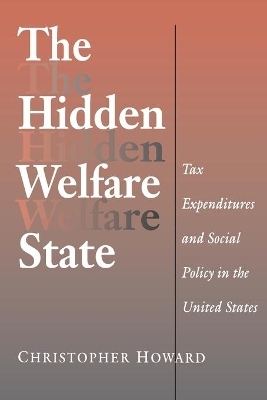
The Hidden Welfare State
Tax Expenditures and Social Policy in the United States
Seiten
1999
Princeton University Press (Verlag)
978-0-691-00529-4 (ISBN)
Princeton University Press (Verlag)
978-0-691-00529-4 (ISBN)
Aalyzes the "hidden" welfare state created by such programs as tax deductions for home mortgage interest and employer-provided retirement pensions, the Earned Income Tax Credit, and the Targeted Jobs Tax Credit. This book focuses on the reasons why individuals, businesses, and public officials support tax expenditures.
Despite costing hundreds of billions of dollars and subsidizing everything from homeownership and child care to health insurance, tax expenditures (commonly known as tax loopholes) have received little attention from those who study American government. This oversight has contributed to an incomplete and misleading portrait of U.S. social policy. Here Christopher Howard analyzes the "hidden" welfare state created by such programs as tax deductions for home mortgage interest and employer-provided retirement pensions, the Earned Income Tax Credit, and the Targeted Jobs Tax Credit. Basing his work on the histories of these four tax expenditures, Howard highlights the distinctive characteristics of all such policies. Tax expenditures are created more routinely and quietly than traditional social programs, for instance, and over time generate unusual coalitions of support. They expand and contract without deliberate changes to individual programs. Howard helps the reader to appreciate the historic links between the hidden welfare state and U.S. tax policy, which accentuate the importance of Congress and political parties.
He also focuses on the reasons why individuals, businesses, and public officials support tax expenditures. The Hidden Welfare State will appeal to anyone interested in the origins, development, and structure of the American welfare state. Students of public finance will gain new insights into the politics of taxation. And as policymakers increasingly promote tax expenditures to address social problems, the book offers some sobering lessons about how such programs work.
Despite costing hundreds of billions of dollars and subsidizing everything from homeownership and child care to health insurance, tax expenditures (commonly known as tax loopholes) have received little attention from those who study American government. This oversight has contributed to an incomplete and misleading portrait of U.S. social policy. Here Christopher Howard analyzes the "hidden" welfare state created by such programs as tax deductions for home mortgage interest and employer-provided retirement pensions, the Earned Income Tax Credit, and the Targeted Jobs Tax Credit. Basing his work on the histories of these four tax expenditures, Howard highlights the distinctive characteristics of all such policies. Tax expenditures are created more routinely and quietly than traditional social programs, for instance, and over time generate unusual coalitions of support. They expand and contract without deliberate changes to individual programs. Howard helps the reader to appreciate the historic links between the hidden welfare state and U.S. tax policy, which accentuate the importance of Congress and political parties.
He also focuses on the reasons why individuals, businesses, and public officials support tax expenditures. The Hidden Welfare State will appeal to anyone interested in the origins, development, and structure of the American welfare state. Students of public finance will gain new insights into the politics of taxation. And as policymakers increasingly promote tax expenditures to address social problems, the book offers some sobering lessons about how such programs work.
Christopher Howard is Assistant Professor of Government at the College of William and Mary.
List of TablesAcknowledgmentsAbbreviationsCh. 1Sizing Up the Hidden Welfare State17Ch. 2Home Mortgage Interest and Employer Pensions48Ch. 3Earned Income Tax Credit64Ch. 4Targeted Jobs Tax Credit75Ch. 5Home Mortgage Interest93Ch. 6Employer Pensions115Ch. 7Earned Income Tax Credit139Ch. 8Targeted Jobs Tax Credit161Ch. 9Politics of the Hidden Welfare State175Appendix: List of Interviews193Notes195Index247
| Erscheint lt. Verlag | 14.3.1999 |
|---|---|
| Reihe/Serie | Princeton Studies in American Politics |
| Zusatzinfo | 7 tables |
| Verlagsort | New Jersey |
| Sprache | englisch |
| Maße | 152 x 229 mm |
| Gewicht | 397 g |
| Themenwelt | Recht / Steuern ► Steuern / Steuerrecht |
| Sozialwissenschaften ► Pädagogik ► Sozialpädagogik | |
| Sozialwissenschaften ► Soziologie | |
| Wirtschaft ► Volkswirtschaftslehre ► Wirtschaftspolitik | |
| ISBN-10 | 0-691-00529-X / 069100529X |
| ISBN-13 | 978-0-691-00529-4 / 9780691005294 |
| Zustand | Neuware |
| Haben Sie eine Frage zum Produkt? |
Mehr entdecken
aus dem Bereich
aus dem Bereich
Grundlagen - Konzepte - Methoden
Buch | Softcover (2023)
Kohlhammer (Verlag)
CHF 47,60
Entwicklung - Versorgung - Bildung
Buch | Softcover (2021)
Kohlhammer (Verlag)
CHF 58,75
Orientierungswissen für die Soziale Arbeit
Buch | Softcover (2024)
Kohlhammer (Verlag)
CHF 49,95


